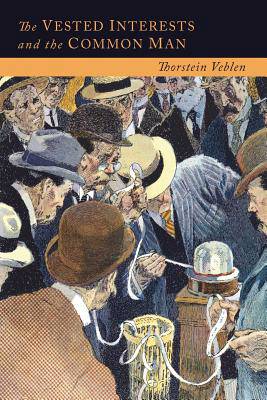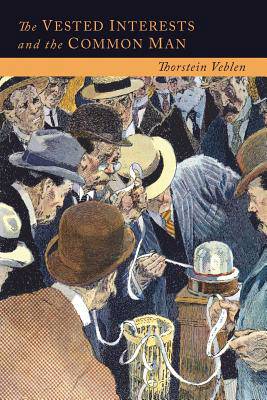
Je cadeautjes zeker op tijd in huis hebben voor de feestdagen? Kom langs in onze winkels en vind het perfecte geschenk!
- Afhalen na 1 uur in een winkel met voorraad
- Gratis thuislevering in België vanaf € 30
- Ruim aanbod met 7 miljoen producten
Je cadeautjes zeker op tijd in huis hebben voor de feestdagen? Kom langs in onze winkels en vind het perfecte geschenk!
- Afhalen na 1 uur in een winkel met voorraad
- Gratis thuislevering in België vanaf € 30
- Ruim aanbod met 7 miljoen producten
Zoeken
The Vested Interests and the Common Man
The Modern Point of View and the New Order
Thorstein Veblen
Paperback | Engels
€ 16,45
+ 32 punten
Uitvoering
Omschrijving
2014 Reprint of 1946 Edition. Full facsimile of the original edition, not reproduced with Optical Recognition Software. Many of the essays in this collection originally appeared in "Dial" from October 1918 to January 1919. "The Vested Interest" includes: "The Instability of Knowledge and Belief," "The Stability of Law and Custom," "The State of the Industrial Arts," "Free Income," "The Vested Interests," "The Divine Rights of Nations," "Live and Let Live," and "The Vested Interests and the Common Man." Veblen saw an inherent conflict between financial interests and industrial interests. Veblen's two-class model of social stratification includes a financial class, which owns wealth invested in large holdings, and an industrial class, whose conditions of life are controlled by others and who live by work. On the one hand, financial leaders are almost exclusively concerned with financial matters-especially profit-and make no contribution to production. Veblen sees these captains of industry as parasitic and exploitative. On the other hand, industry is oriented toward workmanship and production. Unlike the pecuniary financial orientation, the industrial orientation is an impersonal standpoint of quantitative relations and mechanical efficiency. According to Veblen, financial leaders obstruct the operation of the industrial system. Veblen argued that an advanced industrial society would be run most efficiently by production engineers who would look out for the welfare of all members of society rather than the vested interests of business.
Specificaties
Betrokkenen
- Auteur(s):
- Uitgeverij:
Inhoud
- Aantal bladzijden:
- 192
- Taal:
- Engels
Eigenschappen
- Productcode (EAN):
- 9781614276333
- Verschijningsdatum:
- 23/05/2014
- Uitvoering:
- Paperback
- Formaat:
- Trade paperback (VS)
- Afmetingen:
- 152 mm x 229 mm
- Gewicht:
- 290 g

Alleen bij Standaard Boekhandel
+ 32 punten op je klantenkaart van Standaard Boekhandel
Beoordelingen
We publiceren alleen reviews die voldoen aan de voorwaarden voor reviews. Bekijk onze voorwaarden voor reviews.









